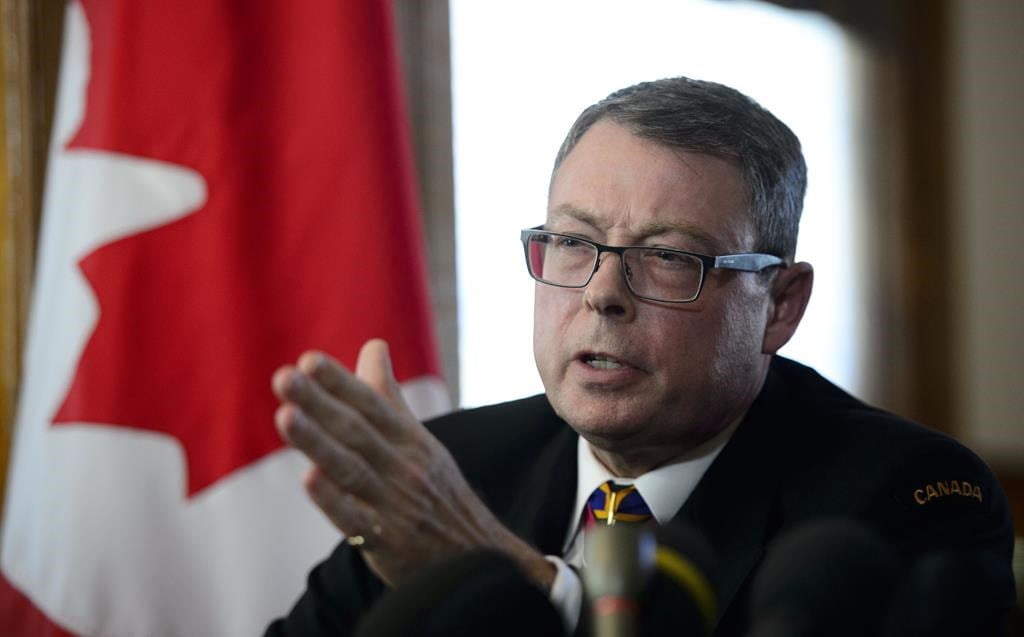Support strong Canadian climate journalism for 2025
Vice-Admiral Mark Norman's stated desire to return to active duty after the breach-of-trust case against him was dropped this week is raising a thorny question for the military's top brass: Where can he go?
The federal Conservatives are demanding Norman be reinstated as Canada's vice-chief of defence staff, the military's second-in-command, the position he took over in August 2016 before being suspended and later replaced because of the case against him.
At a news conference on Thursday, in which he accused the Liberal government of interfering in Norman's case, Conservative foreign-affairs critic Erin O'Toole called for Norman to be "restored to the position he never should have been taken from."
But that seat is taken now by Lt.-Gen. Paul Wynnyk, who got the job officially last July. While the Tories say they would be content with Norman being given a position of equal stature, the reality is that there is no such job. The chief of the defence staff is at the top of the Canadian Forces hierarchy, the vice-chief is second, and neither position has a peer.
Before his last promotion Norman was head of the Royal Canadian Navy, so for him, even commanding an entire service branch would be a lesser post.
The decision on where to put Norman ultimately rests with defence chief Gen. Jonathan Vance, not the government, and Vance is expected to meet with Norman in the coming days to discuss next steps.
Several retired military officers told The Canadian Press Vance will face a real challenge when it comes to moving either Norman or Wynnyk to a new position.
"The situation is unprecedented," said retired colonel Brett Boudreau, who previously served in senior public-affairs positions at National Defence Headquarters and NATO.
"Certainly the challenge for (Vance) and Vice-Admiral Norman is obviously to come to terms with an arrangement that makes sense for everybody. Both for the two personalities involved and for the institution."
Norman has not explicitly said whether he wants to return as second-in-command, and instead insisted shortly after his case was dropped that the military is "bigger than any one person."
For his part, Vance issued a statement saying he looked forward to welcoming Norman "back to work as soon as possible."
Defence Minister Harjit Sajjan initially appeared to pour cold water on the prospects of Norman returning to his old job, saying Wednesday shortly after Crown prosecutors stayed their case against Norman that Wynnyk would "remain in place."
The minister later walked back those comments, saying only that Vance and Norman would meet to talk about next steps.
Not that there aren't options, said retired colonel Michel Drapeau, who is now an expert on military law. Vance, for example, could make Norman or Wynnyk an adviser in his office or have either serve as a military attache in a foreign country.
But most of those moves "would be seen by the general public and members of the Forces as a demotion," said Drapeau, "particularly if it's a make-believe or create-work position like it would be if it was special adviser to the chief of defence staff."
One possible solution, Drapeau said, would be for the government itself to find a very senior position outside the military for Norman, such as an ambassadorship.
However, also hanging over any decision is the question of whether Norman will file a lawsuit against the government and what he plans to say in public after asserting on Wednesday that he has "an important story to tell that Canadians will want and need to hear."
"It's going to be interesting to what extent he actually puts that full story out, which could affect the sort of job he wants to do or is given," Boudreau said.





Comments
For this episode Mr. Trudeau and friends should feel truly remorseful....and for SNC too.